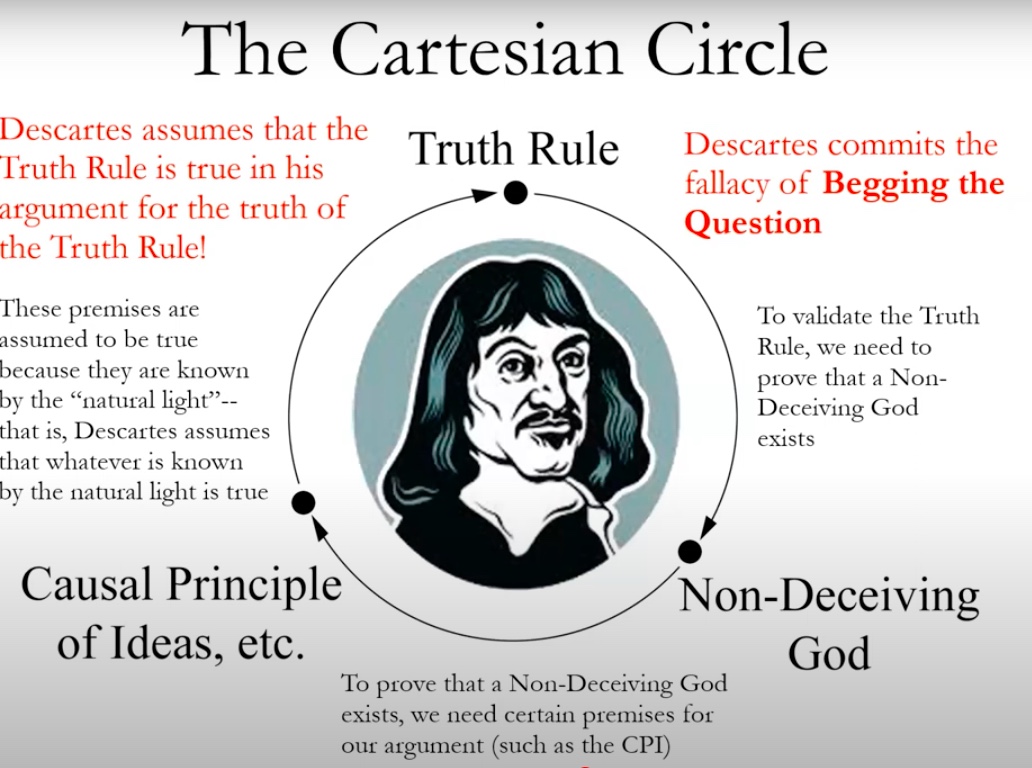philosophy module 4
1/19
There's no tags or description
Looks like no tags are added yet.
Name | Mastery | Learn | Test | Matching | Spaced |
|---|
No study sessions yet.
20 Terms
Define JTB
Knowledge is a belief that is true and that we have a justification to hold that belief
Descartes and the method of doubt goal?
To find at least one true belief by casting doubt on every belief that he could and see if any of these beliefs were undoubtedly true.
Distrusting our senses 2nd formulation
The senses sometimes deceive us
We cannot distinguish occasions when they do from ones when they don’t
So, for all we know, any particular sense experience may be deceiving us
How do we acquire what is true?
The senses or through the senses
Mistrusting our senses argument MP
If something deceives me even once, then I should not fully trust that thing
My senses have deceived me at least once
Therefore, should not fully trust my senses
Valid argument
Sound?
What conclusions can be drawn from the MP distrusting sense argument
We should not fully trust our senses. So should we doubt everything ?
A priori knowledge says we can know some things that are still true, regardless of our senses
A priori knowledge
Knowledge that is independent of our senses that can be gained through pure reason and logic without having to experience or gather evidence from the world.
Example: a square has 4 sides
Or 2+3=5
A posteriori knowledge
Knowledge that requires experience or evidence gathered from the world so it cannot be gained through the use of reason and logic alone
Purpose of thought experiments
Allows philosophers to discuss possibilities beyond those that we can test in reality. We can then use our reason to see what would logically follow from these possibilities
Formalised dreaming argument
If I don’t know that I am not dreaming, then I can’t know that my experiences are real and my beliefs are true
I don’t know that I am not dreaming since dreams and reality are indistinguishable
Therefore, I can’t know that my experiences are real, and my beliefs are true
Valid MP
Critiques of the dreaming argument
Premise 1 critique: even the weirdest things we see in dreams are inspired by real experiences, so even if my dreams are false, they are based on things I have seen in reality. Even in dreams I still A priori knowledge and can know 2+3=5
Premise 2 critique: may say there are never any sure signs by means of which being awake can be distinguished from being asleep. This is wrong because lucid dreamers use many techniques to come to know that they are dreaming.
So the argument doesn’t seem sound
Conclusions we can draw from the dreaming argument
It casts doubt on those beliefs we have gained through our senses (A posteriori beliefs) but A priori knowledge is safe
What is the evil demon thought experiment
An all powerful entity whose only goal is to deceive me. It can deceive me about everything. It can deceive my a priori and a posteriori knowledge. It can trick my senses and my logical faculties.
Formalised evil demon argument
If I were deceived by an evil demon, then all of my beliefs would be false
It is possible that I am being deceived by an evil demon
Therefore it is possible that all of my beliefs are false
Can the evil demon argument be critiqued?
Premise 2: we would need to prove with certainty that the evil demon doesn’t exist
What is the cogito
Cogito ergo sum- I think therefore I am
This is one piece of uncountable knowledge
Why is the cogito undoubtable
I don’t know if I have a body or if I existed before this or will after this moment or if anyone else exists. However, I exist as some sort of consciousness (a Cartesian mind)
What does Descartes believe about cogito and god
He has a clear and distinct perception of cogito’s truth. So anything he has a clear and distinct perception of must be true. Descartes has a clear and distinct idea of perfection and this idea must have a cause. The only perfect thing, which can be a cause for his conception of perfection is God
So god must exist.
If god exists, the problem is solved. God is not a deceiver and would not allow wholesale deception so I can still be concerned about some beliefs but I can use the clear and distinct perception method to build up more beliefs . This is the trademark argument
Formalised trademark argument
I have the idea of a perfect being
This idea must have a cause that is at least as perfect as the idea itself
So something perfect exists
This perfect thing is god
Since god is perfect, he would not permit me to be deceived o na grand scale
So I cannot be deceived on a grand scale
Explain the cartesian circle
Descartes assumes the truth of the thing he is trying to prove.
Circular reasoning
